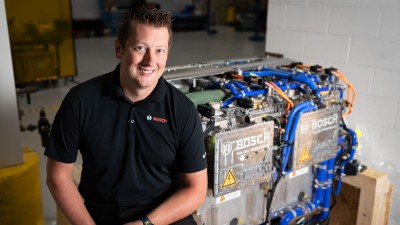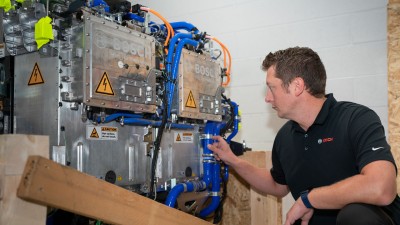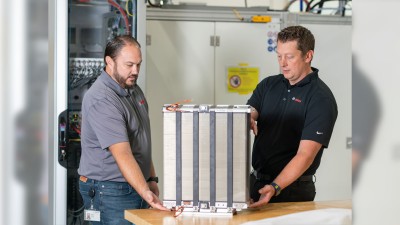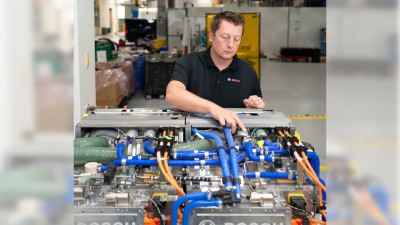Taking on the Big Problems
Bosch engineers develop the hydrogen technologies of the 21st century

For technicians and engineers, the greatest job satisfaction often comes from taking on the most challenging problems.
Today, some of the most stubborn problems can be found in heavy industry, particularly "hard to decarbonize" sectors like steel, cement and heavy trucking. That's where Matt Thorington comes in.
Matt is an Engineering Manager for fuel cell systems at Bosch. He leads a team facing the problem head-on through the development of hydrogen technologies: fuel cells that provide power using hydrogen, and systems that produce hydrogen itself. The systems produce hydrogen through electrolysis, or the splitting of water into hydrogen and oxygen — like a fuel cell in reverse.

"Hydrogen is like a Swiss Army knife," says Matt. It can be used as a fuel, as a store of energy, or as a replacement ingredient to make industries cleaner. The only emission from the fuel cells is water. And the only emission from the electrolysis is oxygen.
Hydrogen has been picking up steam as an industrial tool for the 21st century. Investment is heating up. Novel ways to use it continue to arise, including for making steel and cement.
The fuel cells present an alternative to both batteries and diesel for heavy trucks. "Hydrogen can perform like traditional fuels do in vehicles today." Stacking the hydrogen cells like double AA batteries are stacked in a flashlight delivers the power needed by heavy trucks. Bosch recently began volume production of the hydrogen fuel-cell power modules for electric truck maker Nikola.
And the possibility of using renewable energy to power the electrolysis process further adds to the gas' appeal — effectively offering a way to package that energy and move it around to wherever it is needed.


Bosch expects to begin supplying electrolysis systems to customers such as steel and cement makers in late 2025 or early 2026.
For an engineer, it's hard to beat this level of challenge and importance to the job.
"That's really the greatest challenge, and what makes it fun as an engineer. How can we come up with unique solutions like hydrogen and fuel cells to attack that problem?"
"We can't keep doing the things we're doing today. We have to have large change, and batteries can't do it all. Hydrogen is the solution to go along with batteries. And the time is now."
When Matt started at Bosch, he was an engineer working on technology for diesel engines. Through a combination of his existing knowledge and by educating himself on hydrogen, he has become an expert at Bosch on hydrogen technology. Matt saw the growing need for solutions in this sector and Bosch allowed him the space to grow his expertise and his career with hydrogen.
Developing green and clean technology satisfies the engineer in him in another way, too. He grew up with asthma as a child. "Pollution affects a lot of people. Helping others breathe cleaner is a driving force for me. I align a lot with Bosch values, like 'Invented for Life' — making products that impact people's lives for the better. That really resonates with me."

